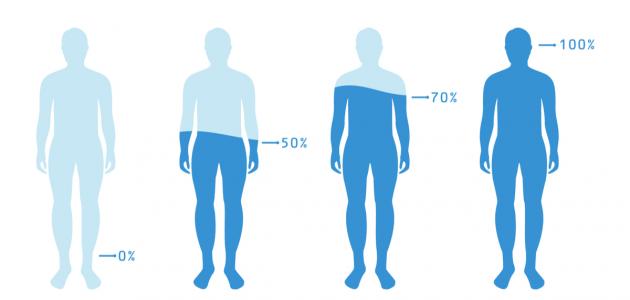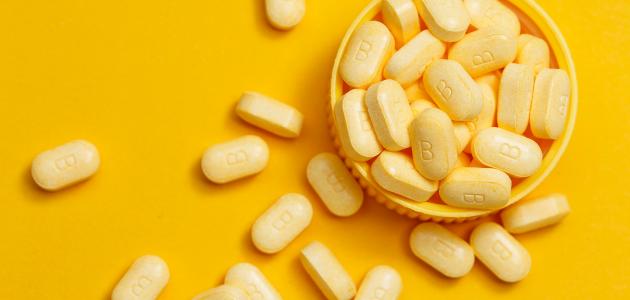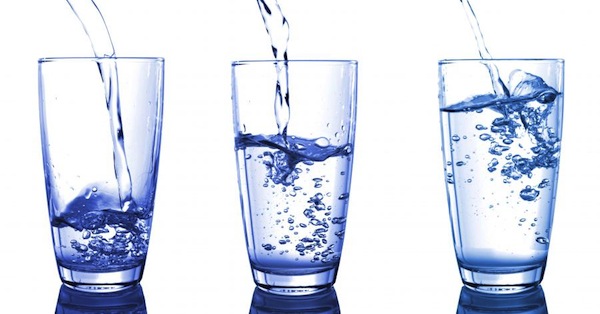Contents
water
Water is the essential component of life. The percentage of water on the surface of the earth is estimated at 71%, and it constitutes 60% of the human body. Water was mentioned in the Holy Qur’an, including the words of the Almighty: (And we made from water every living thing, will they not believe) . Water is the best source for replacing the body’s needs of fluids that it loses during the day through sweating, urination and breathing. It is free of calories , caffeine and alcohol. [1] [2]
The importance of water for the human body
Water is involved in the various body processes, as all cells and organs of the body need it to function properly, and the following points explain the importance of water to the body in detail: [2]
- Control the amount of calories consumed: by drinking water instead of beverages full of calories, it is worth noting that food that contains a high amount of water has a large volume, so it requires chewing more, and the process of absorption is slower, than Helps increase the feeling of satiety.
- Maintaining intestinal health: Water helps the flow of digested food into the digestive system naturally, and helps prevent constipation , but in the event of a lack of daily water intake, the colon will draw water from the stool to be used in various body processes.
- Helping the kidneys to excrete waste outside the body: body fluids transfer the waste inside and outside the cells, then transfer it to the kidneys to be excreted with the urine. When the body gets enough fluid, the urine comes out easily, and it is light in color and free of smell, but when it does not get what Enough fluid, the concentration of urine increases , its color changes, and it smells unpleasant; This is because, in this case, the kidneys trap fluid to carry out other body functions.
- Preventing kidney stones: Drinking water can help prevent kidney stones from forming in people who have been exposed to it earlier. As drinking enough fluids increases the volume of urine passing through the kidneys, and reduces the concentration of minerals, and thus reduces the possibility of the process of crystallization and the formation of lumps.
- Muscle stimulation: as water helps to balance fluids and electrolytes in them, and thus it protects against muscle fatigue and difficulty doing exercise.
- Maintaining the health of the skin: the skin acts as a protective barrier to prevent the loss of large fluids, and it is worth noting that it contains a large amount of water, so drinking water helps prevent dehydration and the formation of wrinkles.
- Headache treatment: Drinking water can help relieve symptoms of headaches and migraines , especially for people who are dehydrated. [3]
- Maintaining the balance of fluids in the body: These are the fluids that are involved in a wide range of different body processes, including: [4] [2]
- Regulating body temperature.
- Delivery of oxygen throughout the body.
- Protection of internal organs and tissues such as the brain , spinal cord, and other internal organs.
- Production of Hormones and Neurotransmitters.
- Contributes to the dissolution of minerals and nutrients, which leads to their transfer to all parts of the body.
- It enters into the process of digestion and absorption, as well as the circulatory system.
- Saliva formation.
- Maintain joint flexibility.
The human body needs water
The body's needs for water vary from person to person depending on many factors, including the level of physical activity , and the amount of sweat. It is worth noting that there is no global agreement on the amount that should be consumed daily, but there is agreement on the healthy amount, as the American National Academy of Sciences, Engineering, and Medicine urges to drink eight cups, and this value is considered more than the common and non-scientific-based guidance, This amount can be considered reasonable, and easy to remember and apply. [2] [4]
The following is mentioned the average recommended daily consumption of water, which is obtained through drinking it in addition to eating foods that contain a high percentage of water such as: soups, vegetables such as tomatoes, and fruits such as oranges, which constitute only 20% of the recommended amount, According to the US National Academy of Sciences, Engineering, and Medicine: [2]
- For a man: 3.7 liters, or about 15.5 cups.
- For women: 2.7 liters, or about 11 cups.
While the amount of water that must be obtained varies in the case of relying on drinking water and other drinks only, which represents 80% of the recommended amount, and depending on that, it is necessary to drink: [2]
- For men: 12.5 cups.
- For women: about 9 cups.
The consequences of dehydration
A person can be exposed to dehydration when the amount of water entering the body does not equal the amount lost during the day, and the possibility of dehydration can increase in hot climates, and during harsh exercises, and in the elderly, and among the negative effects that dehydration can cause are the following: (4) ] [2]
- Hypertension; This is due to the increased density of the blood, as water makes up 90% of the blood .
- The air passages narrow to reduce the body's loss of water, which worsens asthma and allergies.
- The skin is more exposed to skin problems and premature wrinkles.
- Gastrointestinal problems, such as: heartburn and stomach ulcers, due to excess stomach acid .
- Joint pain, in addition to reducing the ability of the joints to absorb shock.
- Negatively affecting the performance of brain function , and this can lead to problems with thinking skills, logic and memory, in addition to decreased levels of energy and mood. [3] [4]
References
- ↑ Surah Al-Mu`minun, verse 30:
- ^ A b t w c h x "Why is drinking water important?" , www.medicalnewstoday.com , Retrieved 2018-6-3. Edited.
- ^ A b "7 Science-Based Computer Health Benefits Of Drinking Water Enough" , Www.healthline.com , Retrieved 2018-6-3. Edited.
- ^ A b t w "6 Reasons To Drink Water" , the www.webmd.com , Retrieved 2018-6-3. Edited.





